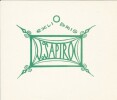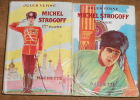-
Type
Any type (1)
Autograph (1)
Book (6685)
Engraving (27)
Magazine (369)
Maps (86)
Music sheets (48)
Old papers (2)
Photographs (58)
Postcards (1)
Posters (1)
-
Latest
Last 24h (5)
Last 3 days (2)
Last month (68)
Last week (6)
-
Language
Albanian (1)
English (10)
French (7242)
German (6)
Italian (1)
Russian (17)
Spanish (2)
-
Century
16th (4)
17th (16)
18th (148)
19th (824)
20th (2697)
21st (364)
-
Countries
Belgium (461)
Brazil (1)
Canada (12)
China (5)
Côte d'Ivoire (14)
Denmark (6)
France (6101)
Greece (6)
Italy (72)
Netherlands (2)
Switzerland (599)
-
Syndicate
ALAC (12)
CLAM (3)
ILAB (2531)
NVVA (225)
SLACES (223)
SLAM (2204)
SNCAO (72)
Des forces productives, destructives & improductives de la Russie. Deuxième édition.
Paris, Librairie A. Franck, 1861, in-8vo, XVI + XXII + 364 p., + 10 cartes reliure en d.-cuir originale, dos usé.

(SLACES, NVVA)
Phone number : 41 (0)26 3223808
Voyage Agronomique en RUSSIE. Lettres et notes sur une deuxième excursion faite en 1860-1861.
Franck Paris 1863 1 vol. In-8 de 2 ff.n.ch. XXIV 428 pp., pleine percaline de l'époque, dos lisse fileté, tranches marbrées.
Edition originale de cette sérieuse étude agronomique de la Russie. Ouvrage agrémenté d'un tableau et d'une grande carte repliée de son itinéraire.
JOURNAL DES VOYAGES et des aventures de terre et de mer : monde pittoresque : terre illustrée réunis.AUGUSTE TERRIER
Reference : 15549
LES VRAIE VICTIMES la guerre russo-japonaise
journal heddomadaire 24x33 - paginée de 129 à 144 - illustrations - n°425 - dimanche 22 janvier 1905.
ILLUSTRATION DE LA COUVERTURE par MONTBARD ( c'est sous la direction des Cosaques qu'a lieu le lugubre défilé )envoi possible d'un scan de la couverture
JOURS de CHASSE
N° 14 - Hiver 2003: revue de 194 pages, format 285 x 235 mm, illustrée, brochée
Au sommaire : approche d'hiver ; les tétras de Chamrousse ; l'autre Jura ; Prud'Hon le chasseur d'émotions, chasse à l'aigle en Mongolie ; safari en Tanzanie, chasses au temps des tsars, les carabines Steyr-Mannlicher ; invitation au Castello di Tagliolo (Piémont)
Phone number : 04 74 33 45 19
Ex-libris.
J Puipienes (Russie, Lituanie, Europe de l'Est), Ex-libris. Ex-libris, 115*81mm. [335-3]
Ex-libris.
J. Sapiro (Russie, Lituanie, Europe de l'Est), Ex-libris. Ex-libris, 98*66mm, pli à un coin. [334-1]
Ex-libris.
J Sapiro (Russie, Lituanie, Europe de l'Est), Ex-libris. Ex-libris, 75*87mm. [334-3]
Ex-libris.
J Sapiro (Russie, Lituanie, Europe de l'Est), Ex-libris. Ex-libris, 91*67mm. [334-3]
Ex-libris.
J Sapiro (Russie, Lituanie, Europe de l'Est), Ex-libris. Ex-libris, 84*58mm. [335-1]
Ex-libris.
J Sapiro (Russie, Lituanie, Europe de l'Est), Ex-libris. Ex-libris, 95*81mm. [335-2]
Ex-libris.
J.S. Skackausku (Russie, Lituanie, Europe de l'Est), Ex-libris. Ex-libris, 83*71mm. [334-4]
Theologia dogmatica christianorum orientalium ab ecclesia catholica dissidentium. Volume I: Theologiae dogmaticae graeco-russorum. Origo, historia, fontes
Parisiis [Paris], Letouzey et Ané 1926 727pp., text in latin, 23cm., orig.softcover, VG, X58592
Partition de la chanson : Sainte Russie Balalaïka Théâtre Mogador
Partitions sur la Russie Eschig Max 1936
Très bon état Petit format
LE MENAGE MURAT
reliure éditeur - 14x21- 248pp - 1958 - éditions bibliothèque reliés LE LIVRE CONTEMPORAIN - collection présence de l'histoire dirigée par André CASTELOT
"Jules Pigasse (Chateaubriand et l'Occitannienne) André Ferran Jean Douyau (Femmes de Russie) Alban Guyraud et Alex Coutet (le Cirque et moi)"
Reference : 100074107
(1930)
"L'Archer n°2"
"Toulouse/ Paris. 16 5 cm x 24 cm. 1930. Broché. 98 pages. Toulouse/ Paris L'Archer février 1930 e.o. numérotée (n°180). Broché 16 5 cm x 24 cm 98 pages photos et illustrations noir chroniques de Paul Voivenel M. Gaston-Martin A. Cazelles ...Bon état" "Bon état"
"Michel Strogoff"
"1928. Paris Éditions Hachette Bibliothèque Verte 1928 - Cartonné bien complet de la jaquette 12 5 cm x 18 5 cm 251+ 241 pages - Texte de Jules Verne couv. et ills noir et blanc de Henri Faivre - Jaquettes en état d'usage sinon bon état"
"L'Assassinat de Trotsky"
"1970. Paris Éditions Julliard 1970 - Cartonné bien complet de la jaquette 14 cm x 21 cm 318 pages planches photographiques hors-texte - Texte de Julian Gorkin biographie de l'auteur sur le rabat de la jaquette - Très bon état"
Ex-libris.
Juliaus Buteno (Russie, Lituanie, Europe de l'Est), Ex-libris. Ex-libris, 98*71mm. [335-1]
Ex-libris.
Juno (?) (Russie, Lituanie, Europe de l'Est), Ex-libris. Ex-libris, 88*75mm. [335-1]
"Pu?kin n Ego Sovremenniki (Pouchkine et ses contemporains"
"Moscou. 15 5cm x 22 5 cm. 1968. Cartonné. 423 pages. MoscouIzatel Stvo Nauka 1968. Cartonné bien complet de la jaquette 15 5 cm x 22 5 cm 423 pages. Texte en russe de Ju. N. Tynjanov bibliographie envoi en russe ex-libris d 'Arnold Blokh envoi en français faisant référence à lui - Bon état" "Bon état"
Cruces de abedul, voluntarios flamencos en la Campana de Rusia
Garcia Hispan, editor Dos carré collé 1989 In-12 dos carré collé, (14,4 * 20,2 cm), 108 pages, envoi à Jean Mabire ; dos insolé, très bon état. Livraison a domicile (La Poste) ou en Mondial Relay sur simple demande.
J.V., non identifié (Russie, Lituanie, Europe de l'Est), Ex-libris.
Reference : 011825
Ex-libris.
J.V., non identifié (Russie, Lituanie, Europe de l'Est), Ex-libris. Ex-libris, 90*79mm. [335-4]
Ex-libris.
J Ziniausko (Russie, Lituanie, Europe de l'Est), Ex-libris. Ex-libris, 80*64mm. [335-2]
Ex-libris.
J Ziniausko (Russie, Lituanie, Europe de l'Est), Ex-libris. Ex-libris, 115*74mm. [335-3]
Davos. Profil eines Phänomens.
Zürich, Offizin, 1994, gr. in-8°, 223 S., reich illustriert mit Fotomaterial, Original-Leinenband mit illustriertem Umschlag. Neuwertig.
E.a.: Petra Bischof: Russen in Davos - Die russische Kolonie von 1900 bis 1918. / Siegrist, Marguerit: Engländer in Davos, und vieles Medizinisches.

(SLACES, NVVA)
Phone number : 41 (0)26 3223808
 Write to the booksellers
Write to the booksellers






















